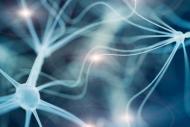Poor performance on a simple odor identification test was associated with a significantly increased risk of developing dementia years later.
Lily Jan and Yuh-Nung Jan have received the 2017 Vilcek Prize in Biomedical Science, which recognizes extraordinary contributions to biomedical research made by immigrants to America.
Distinct sets of genetic defects in a single neuronal protein can lead either to infantile epilepsy or to autism spectrum disorders.
A common treatment for irregular heartbeats known as catheter ablation may result in the formation of brain lesions when it is performed on the left side of the heart.
For concussion sufferers, physicians may now be able to predict early on who is more likely to continue experiencing symptoms months or years after the head-jarring event.
Children with severe cases of epilepsy such as Dravet syndrome are finding new and unexpected cures thanks to determined pediatricians and translational research at UCSF.
UC San Francisco and Pfizer Inc.’s Centers for Therapeutic Innovation have renewed an agreement to identify and develop biologic compounds against both known and novel targets.
Researchers at UCSF have developed a new optogenetic tool that can be used to completely eliminate single cells from brain networks in animals. The researchers believe the new tool will enable exquisitely precise experiments to help researchers understand how each cell contributes to the whole.
The UCSF community is deeply saddened to learn of the passing of William K. Bowes Jr., a Bay Area venture capitalist whose dedicated volunteer service and generous philanthropy supported medical research, access to college, higher education and the arts.
In findings that show the effectiveness of a new strategy for treating multiple sclerosis, researchers are reporting positive results from three large, international, multicenter Phase III clinical trials of the investigational drug ocrelizumab in both relapsing multiple sclerosis and primary progressive multiple sclerosis.








